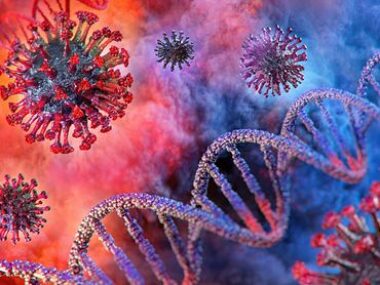Rheumatoid Arthritis, Not AS, Linked to Severe COVID-19 Risk
The US study reviewed data on nearly 500,000 people
Written by |

People with ankylosis spondylitis (AS) may not be at an increased risk of developing severe symptoms of COVID-19, according to a large U.S. study.
That’s not the case, however, with those with rheumatoid arthritis, another immune-mediated disease, who were found to have a 20% higher risk of developing severe COVID-19 than the general population.
The study, “Risk of severe COVID-19 outcomes among patients with immune-mediated inflammatory diseases or malignancies: A retrospective analysis of real-world data in the United States,” was published by a team of researchers in the U.S. in Advances in Therapy.
AS occurs when the joints of the spine, and sometimes those in other parts of the body, become inflamed. Inflammation in the joints causes a range of symptoms from pain, swelling, and stiffness to fatigue and heart problems.
In immune-mediated inflammatory diseases such as AS, both immunosuppressive treatments and a weakened immune system can leave people at a higher risk for infections and other diseases. When this happens, they are said to be immunocompromised.
This can make people more likely to become ill with COVID-19 or develop more severe symptoms after an infection. Immunocompromised people are also more likely to fail to respond to vaccines and may not be protected against COVID-19 even if they stay up to date with their vaccination schedule.
“Patients in immunocompromised states are generally considered to be at risk for severe COVID-19,” the researchers wrote. However, no study has set out “to understand how each individual disease contributes to COVID-19 outcomes using the same data source.”
Risk of COVID-19 with immune disease
To find out how likely people with certain immune-mediated diseases or types of cancers are to develop severe COVID-19, the researchers drew on Optum’s database of electronic health records from across the U.S.
They collected data from people who tested positive for the COVID-19-causing virus or received a diagnosis of COVID-19 based on their symptoms between the beginning of February 2020 and March 2021.
Of 499,772 people, more than half (57%) were female (mean age, 46.9). Some 28,926 (5.8%) had at least one dose of a COVID-19 vaccine, whereas the country’s coverage was estimated at 57% in May 2021, according to the researchers.
Severe COVID-19 was defined as either hospitalization within the 14 days prior to and 30 days following a diagnosis, or death within three months of a diagnosis.
Of all people with COVID-19, 67,584 (13.5%) developed severe disease. Those with severe COVID-19 were a mean 19.2 years older than those with milder symptoms (63.5 vs. 44.3). Their mean Charlson comorbidity index score, which predicts mortality for patients who may have a range of coexisting conditions, was also twice as high (2.6 vs. 1.3 points).
After adjusting for the 2010 U.S. Census data, the risk of severe COVID-19 among the general group of patients with COVID-19 was 9.7%, with a hospitalization risk of 9.2% and a mortality risk of 1.7%.
AS risk lower than general population
A total of 409 people in the study had received an AS diagnosis within the 15 months prior to their COVID-19 diagnosis. Almost half (47.9%) were female and their mean age was 54.5 years. About two-thirds (67%) also had a neurological disease and 60.6% had cardiovascular disease or a serious heart condition.
People with AS had a 7.2% chance of developing severe COVID-19, which was lower than that of the general population yet translated into a comparable risk. Those with AS had less chance of hospitalization (6.9%) or death (1.2%) than the general population.
About 1.2% of the people in the study had rheumatoid arthritis, an autoimmune disease that also causes pain, swelling, and stiffness in the joints. These patients were 20% more likely than the general population to develop severe COVID-19. They also were a mean 14.6 years older (61.5 vs. 46.9) and had a higher mean Charlson comorbidity index score (4.6 vs. 1.5 points).
Other diseases linked to a higher risk of severe COVID-19 were hematologic (blood) cancers and solid tumors.
“These findings highlight the need to protect and monitor immunocompromised patients … as part of the strategy to control the pandemic worldwide,” the researchers said.






